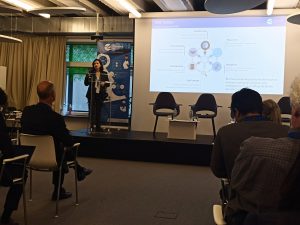Distribution System Operators have a new set of innovative applications, which will help them not only in the operation and planning of the distribution network, but also in the negotiation of new flexibility services on different market platforms. This was one of the main results of the EUniversal project, which also featured an open interface – UMEI, or Universal Market Enabling Interface – that facilitates the interaction between operators and new flexibility markets.
Contribute to the effective implementation of a flexible and interoperable power system – this was the challenge that brought together 19 entities from eight European countries; a consortium that, for almost four years, defined and demonstrated flexibility services and products, developed a toolbox to support electricity grid operations and planning, and ensured the creation of an open interface – agnostic, adaptable, modular and scalable – that facilitates the interaction between operators’ systems, market platforms and aggregators. INESC TEC was one of said entities.
But let’s take it one step at a time. Let’s start with the development of a toolbox for Distribution System Operators (DSO), led by INESC TEC. “This toolbox is a set of innovative applications developed by the different partners to support the operation and planning of the distribution network, considering the integration of consumption and production flexibility”, explained Clara Gouveia.

According to the INESC TEC researcher, the design of these solutions considered the participation of consumers connected to the different voltage levels, and the characteristics of the distribution networks, ensuring coordinated control between the resources connected to the different voltage levels. The goal? To increase network observability and implement a predictive, adaptive, and distributed operation strategy. The project also focused on innovative concept of dynamic flexibility areas that identify which resources and how much to mobilise in the market, without the need to share sensitive network information, while facilitating the submission of offers and a more effective aggregation.
Some of these applications allow, for instance, the quantification of flexibility needs in the Medium Voltage (MV) and Low Voltage (LV) distribution network, as well as “the optimal selection of offers, depending on the design of the local market”. This also allows operators to negotiate new flexibility services on different market platforms.
The solutions have been tested in Portugal, Germany, and Poland
In fact, the testing of trading flexibility on different market platforms, was one of the objectives of the demonstration carried out in Portugal; and now we focus on the demonstration of products and services. Altogether, and within the scope of EUniversal, the demonstrations took place in three countries – Portugal, Germany, and Poland – with different distribution networks and different regulatory frameworks.
In Portugal, four MV networks and nine LV networks located in different regions were considered. “The Portuguese demonstrator set ambitious goals by predicting the testing of flexibility trading on two distinct market platforms to support the operation of the MV and LV networks. The demonstration also explored the acquisition of short- and long-term services to meet the needs of operation planning and investment in the distribution network”, said Clara Gouveia.
According to the researcher, and like the Portuguese pilot, the German demonstrator also sought to validate the negotiation of short-term flexibility services to support the operation of the MV and LV networks. In Poland, the focus was “the flexibility of the distribution network, with emphasis on the testing of dynamic capacity management solutions for High Voltage (HV) lines, to increase the capacity to integrate production from renewable sources; it also focused on testing automatic voltage regulation solutions in MV/LV substations and in the LV network.”
The project features an interface that facilitates distributed communication
The consortium also designed a new approach on the use of flexibility by operators and their interaction with the new flexibility markets, through the development of UMEI. “The interaction between DSO systems, market platforms and aggregators is ensured by UMEI”, stated Clara Gouveia – adding that it is a standardised, agnostic, adaptable and modular approach that combines APIs (Application Programming Interfaces), which can be used by any stakeholder.
In addition, and thanks to this project, the consortium addressed the topic of local flexibility markets to support the distribution network considering the different actors involved – namely the network operator, flexibility market platforms, aggregators, and consumers/producers.
EUniversal – Market Enabling Interface to Unlock Flexibility Solutions for Cost-effective Management of Smarter Distribution Grids – started in 2020, and the final event took place in November 2023, in Brussels. The project received close to €10M from the European Union’s Horizon 2020 research and innovation programme.



 News, current topics, curiosities and so much more about INESC TEC and its community!
News, current topics, curiosities and so much more about INESC TEC and its community!